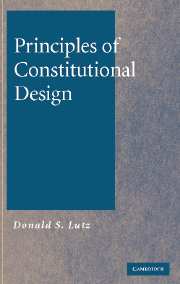Book contents
- Frontmatter
- Contents
- Preface
- Acknowledgments
- Principles of Constitutional Design
- 1 Constitutionalism: An Initial Overview and Introduction
- 2 Sovereignty
- 3 Popular Sovereignty
- 4 The Separation of Powers
- 5 Analyzing the Interaction between Popular Control and the Separation of Powers in the Amendment Process
- 6 Matching a Government to a People
- 7 An Overview of the Constitutional Design Project
- 8 An Underlying Constitutional Logic: Rational Actors?
- Index
3 - Popular Sovereignty
Published online by Cambridge University Press: 29 July 2009
- Frontmatter
- Contents
- Preface
- Acknowledgments
- Principles of Constitutional Design
- 1 Constitutionalism: An Initial Overview and Introduction
- 2 Sovereignty
- 3 Popular Sovereignty
- 4 The Separation of Powers
- 5 Analyzing the Interaction between Popular Control and the Separation of Powers in the Amendment Process
- 6 Matching a Government to a People
- 7 An Overview of the Constitutional Design Project
- 8 An Underlying Constitutional Logic: Rational Actors?
- Index
Summary
The Relationship of Popular Sovereignty to Sovereignty
It must be made clear at the outset of this chapter if we are to make sense of the term “popular sovereignty” that a “popular” sovereign is still a sovereign and therefore a supreme power. Popular sovereignty is sometimes treated as a “God word” – one that seems to be immediately clear and descriptive of an unqualified good. If analysis of the term is to proceed fruitfully, however, one must remember that popular sovereignty is by definition both a supreme power and one that is limited. An analysis of popular sovereignty is therefore a logical extension of an analysis of sovereignty, because any theory of popular sovereignty first requires a clear and useful concept of sovereignty. By the same token, rejecting the notion of sovereignty as somehow time-bound, no longer relevant, or merely mythical entails conferring the same status on popular sovereignty as well. This in turn implies the rejection of constitutional democracy and constitutional republicanism and brings into question constitutionalism of any sort. If one does not like the term “sovereignty” and prefers to use a different vocabulary to describe a limited supreme power, the shift in language will not alter the fact that we are still talking about the same thing. Like the green, leafy thing outside my window, the limited supreme power will continue to exist and function. Those who would like to change the language need to show the advantages that will result.
- Type
- Chapter
- Information
- Principles of Constitutional Design , pp. 67 - 108Publisher: Cambridge University PressPrint publication year: 2006



